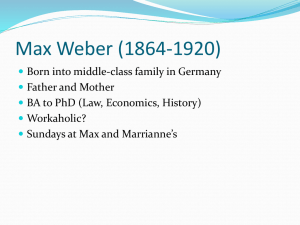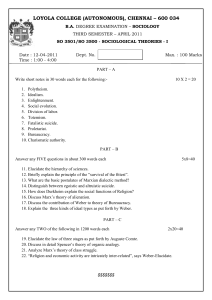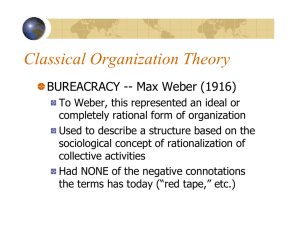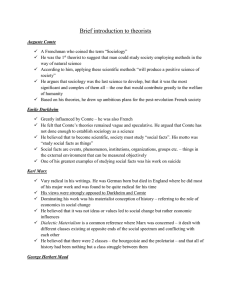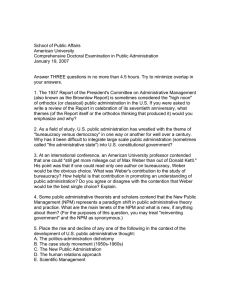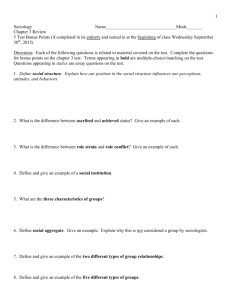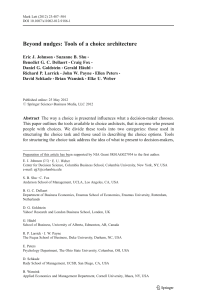“Objectivity” in Social Science and Social Policy can should
advertisement
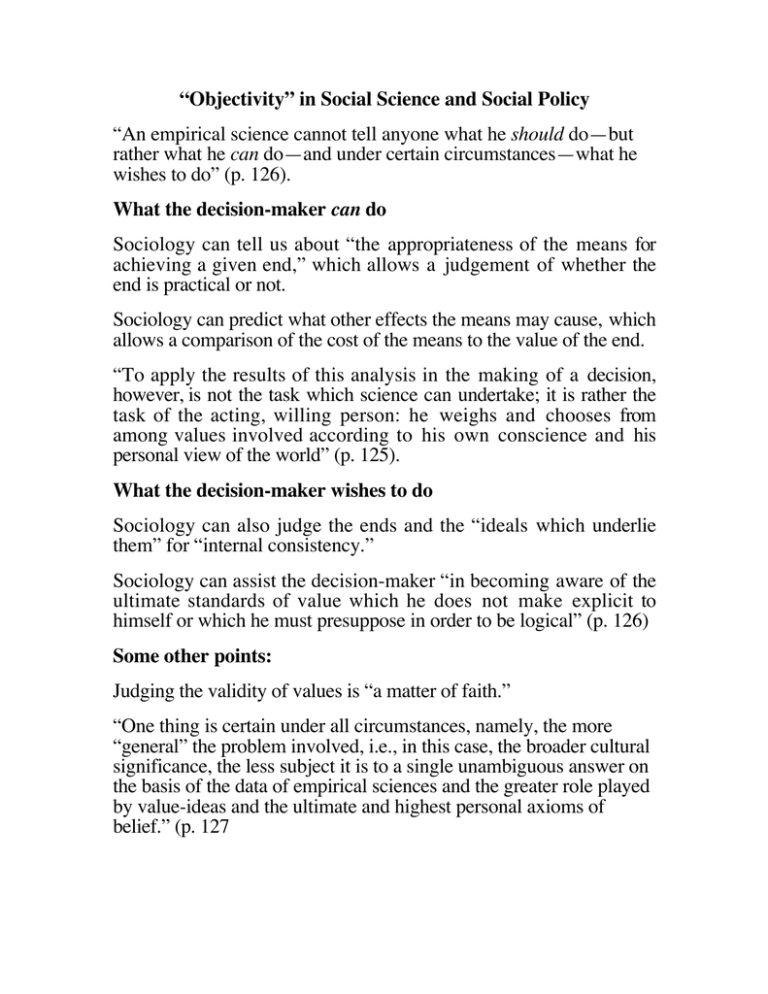
“Objectivity” in Social Science and Social Policy “An empirical science cannot tell anyone what he should do—but rather what he can do—and under certain circumstances—what he wishes to do” (p. 126). What the decision-maker can do Sociology can tell us about “the appropriateness of the means for achieving a given end,” which allows a judgement of whether the end is practical or not. Sociology can predict what other effects the means may cause, which allows a comparison of the cost of the means to the value of the end. “To apply the results of this analysis in the making of a decision, however, is not the task which science can undertake; it is rather the task of the acting, willing person: he weighs and chooses from among values involved according to his own conscience and his personal view of the world” (p. 125). What the decision-maker wishes to do Sociology can also judge the ends and the “ideals which underlie them” for “internal consistency.” Sociology can assist the decision-maker “in becoming aware of the ultimate standards of value which he does not make explicit to himself or which he must presuppose in order to be logical” (p. 126) Some other points: Judging the validity of values is “a matter of faith.” “One thing is certain under all circumstances, namely, the more “general” the problem involved, i.e., in this case, the broader cultural significance, the less subject it is to a single unambiguous answer on the basis of the data of empirical sciences and the greater role played by value-ideas and the ultimate and highest personal axioms of belief.” (p. 127 Weber on Class, Status and Party Power: “the chance of a [person] or a number of [people] to realize their own will even against the resistance of others who are participating in the action” (p. 136). Classes, status groups and parties are “phenomena of the distribution of power within the community” (p. 137). Weber opposes Marx’s two-class, class-driven model. Classes: people who share similar life chances based on economic interests in commodity or labor markets. Property owners and non-owners are two basic categories, but other variations exist. “But this is the generic connotation of the concept of class: that the kind of chance in the market is the decisive moment which presents a common condition for the individual’s fate” (p. 137138). Disagrees with Marx’s “pseudo-scientific” claim that “the individual may be in error concerning his interests but that the class is infallible about its interests” (p. 139). Classes may be a base for collective action, but not necessarily so. Status groups: depends upon “social estimation of honor” (p. 140). May or may not be linked to class. “Status honor is normally expressed by the fact that above all else a specific style of life is expected from all those who wish to belong to the circle” (p. 141). Ethnic groups and castes are examples of status groups. Parties: “reside in the sphere of power” and are “oriented toward the acquisition of social power, that is to say, toward influencing social action no matter what its content may be” (p. 145). While classes are not communities and status groups only amorphous communities, parties are structures. Parties may, or may not, represent class or status interests. Weber on Bureaucracy Ideal type: concept designed to capture essential features of a social phenomenon Key components of ideal-typical bureaucracy: (1) Jurisdiction defined by rules and regulations (2) Hierarchy of offices (3) Based upon written documents (4) Specialization (5) Demands full working capacity of officials (technical competence) (6) Management follows general rules (impersonality) Bureaucracy and Education Universities are “dominated and influenced by the need for the kind of ‘education’ which is bred by the system of specialized examinations or tests or expertise increasingly indispensable for modern bureaucracies” (p. 121). Other educational systems have been attempted to produce a “cultivated man” having “a quality of life conduct which was held to be ‘cultivated’ was the goal of education, rather than specialized training in some expertise” (p. 123). Bureaucracy and Rationalism The advance of bureaucracy destroys non-“rational” structures of domination
